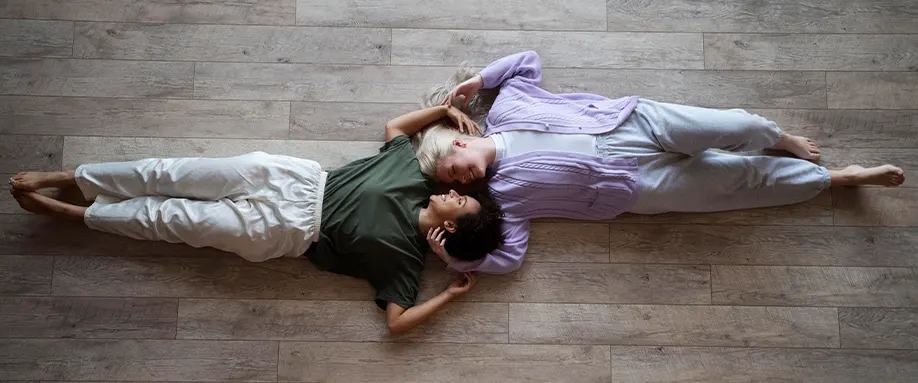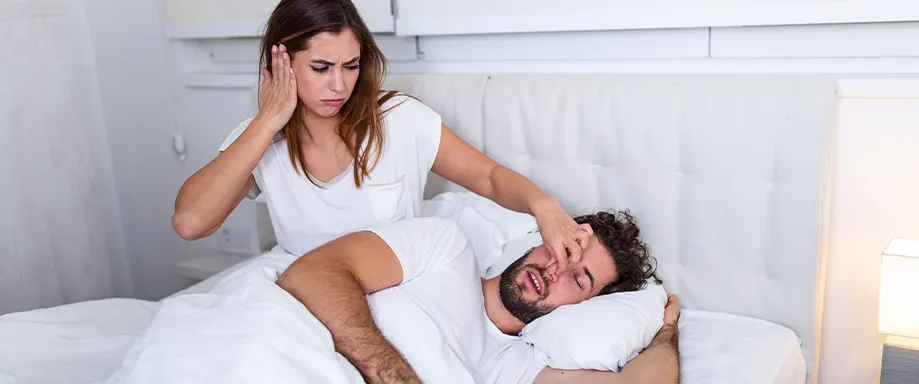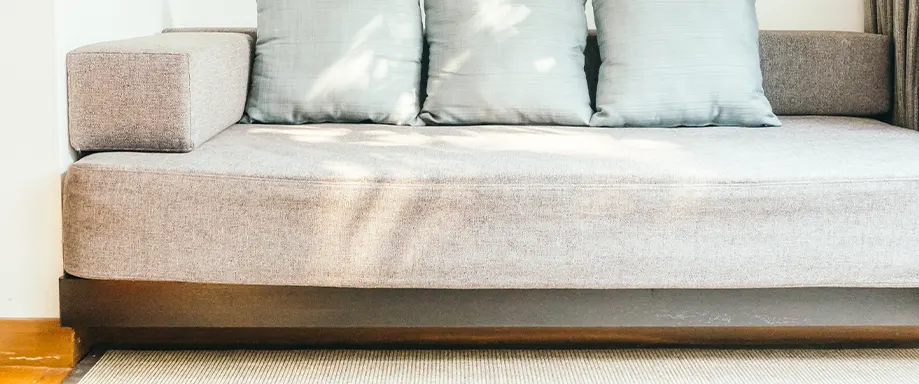Sleeping on the floor and back pain

Back pain is probably the first thing that comes to mind when talking about sleeping on the floor. Are you one of those looking for pain reduction? We have to tell you that the claim that the hard floor can help with back pain is not backed by science.
This does not mean that it is harmful and that you should give it up if it helps you. But you should definitely think about whether your mattress is supportive enough. Maybe the mattress is too soft and so you are looking for support on the floor. But the floor is too firm, which is also not recommended same as too firm mattresses. That's why it would be best to choose a medium mattress if you suffer from back pain.
Will sleeping on the floor help me with my sciatica?
The sciatic nerve is the largest nerve in the human body. It stretches from the lower back to the sole of the foot. Sciatica is pain in some part of this nerve and is one of the frequent problems of a sedentary lifestyle. The direct cause is most often a bulging or herniated disc, but it can also be narrowing of the intervertebral opening or something else.
If you have sciatica, your doctor will recommend you to buy a firmer mattress. You may opt for a floor instead of a firmer mattress, but again there is no evidence that it will help you. While there is certainly evidence that the firm mattress is beneficial for this condition.
Related reading:
Can sleeping on the floor improve my posture?
You can probably conclude that we will tell you the same thing again. Sleeping on the floor can have a positive effect on your posture if you are currently sleeping on a too soft mattress that does not support your body, which leads to improper posture.
The floor will only help temporarily, but as soon as you stand up, the posture will be bad again. It is necessary to strengthen and stretch the muscles so that they are able to maintain proper posture without assistance. If the problem is not only bad posture, but you know you have a disorder such as scoliosis, be sure to consult a doctor or physiotherapist.
Is sleeping on the floor dangerous for pregnant women?
Sleeping on the floor is considered safe for pregnant women. There is no objective reason why you should avoid it if you are comfortable. The only problem can be difficulty getting up and lying down on the floor when you are in the later period of pregnancy. If you find that very challenging you should get back to bed until the labour.
Also, sleeping on the floor is safe for the baby. Although the cause of sudden infant death syndrome (SIDS) is often unknown, suffocation caused by pillows is one of the most frequent known reasons. That is why SIDS is less common in cultures where sleeping on the floor is part of the routine.
Sleeping on the floor: A quick guide

If sleeping on the floor is your thing, we won't try to convince you that you should give it up. What we will do is give you a quick guide.
If you implement the following adjustments, sleeping on the floor will be even more comfortable than before and you will fall asleep quicker.
Have enough space around
If you decide to permanently replace the bed with a floor, you need to declutter the room. It is necessary to leave yourself enough space so that you can move freely in your sleep. This is especially important for restless sleepers who toss and turn all night. After you have made enough space for yourself to sleep safely, make sure to clean the floor regularly. The floor is dirtier than the bed, so you have to clean it every few days, if not every day.
Place a yoga mat, mattress or a blanket on the floor
Although you are comfortable sleeping directly on the floor, you will be more comfortable if you place a mat, mattress or a blanket. The floor is too firm and you need something to make the surface a little softer, while the support remains the same. If you want it to be just a little softer, then go with a mat or a blanket, and if you want a sleep experience closer to that of a bed, then you can choose a mattress topper or even a mattress.
You should be aware that a mattress placed directly on the floor has a shorter service life on average than one supported by a bed frame. Sleep companies always emphasize significance of sturdy bed frame for service life and overall performance.
Test your sleep position
have problems with shoulder and hip pain on a firmer mattress, and then it is certain that the situation will be even worse on the floor. So we don't see how side sleepers can benefit from this. Nevertheless, other sleeping positions – stomach and back sleepers will definitely have a much better night's sleep on the floor compared to side sleepers. Combination sleepers should test it as well, because it depends on which is primary sleeping position for one combination sleepers.
Use a thin pillow
The floor will keep your spine aligned and that's why many people decide to lie on the floor when their back hurts. Low loft pillow is the only answer in this situation. Any higher loft pillow will raise your head too high and this will lead to neck pain.
Related reading:
Use an extra pillow if you are stomach sleeper
While sleeping on the floor is good for a number of front sleepers, they have a high risk of neck and back strain even if the pillow is suitable. It is often recommended to sleep without a pillow, and if you still want to use a thin pillow, then add another one under the pelvic region. Thus, the pressure on the neck and shoulder region will be significantly reduced.
Try a quick nap to see if it suits you
You won't know if sleeping on the floor is for you or not if you don't try it. But don't test this way of sleeping throughout the night, otherwise you risk waking up in pain. A quick afternoon nap will be an excellent indicator of whether you should try a night's sleep or whether you should immediately go back to bed.
Possible drawbacks of sleeping on the floor
It is quite clear that there must be certain drawbacks of sleeping on the floor, otherwise no one would use a bed frame. In that case, the bed frame would be an unnecessary piece of furniture that just takes up valuable space in the bedroom. Drawbacks that we will mention are individual. It does not necessarily mean that you will experience the same drawbacks as someone else. We just want to draw your attention to the possibility that something like that could happen. If you notice any of the following symptoms, consider whether there is some other cause or it is caused by sleeping on the floor. Take steps accordingly to resolve the issue.
Sneezing, runny nose & cold

Do you have weak immunity? Or are you a cold sleeper? If the answer to one or both of these two questions is positive, then we believe that sleeping on the floor will not be comfortable for you. It's definitely cooler on the floor, even if you put a blanket under it. The reason is not only the coldness of the floor, but the cold air is heavier and tends to go down.
During the summer you may feel pleasant because of it, but in the winter you may catch a cold. Sneezing and runny noses can certainly be symptoms of many things, not just sleeping on the floor, but if you can't pinpoint the cause, this could be one.
Coughing & wheezing
Wheezing is a very specific sound that is easy to recognize. It can be the result of so many different things. Sleep apnea is one of the most common culprits, as well as colds and asthma. You probably don't have whooping cough, but some other type of cough usually accompanies wheezing. Whether cough and wheezing are the result of a cold or an allergy remains to be determined. Certainly, both can have something to do with sleeping on the floor. First, try to thoroughly clean the floor and remove even the smallest amount of dust. Then monitor your health to see if you have any accompanying health problems.
Allergy reactions & rashes
Allergies are more common than ever in human history. The reason is the high exposure to chemicals and other toxic substances. There are also allergies that have always been there, such as allergies to pollen and dust mites. If you start sneezing and coughing as soon as you lie down on the floor, it is probably an allergic reaction. In case you are an allergy sufferer then you will know what causes the problem. If you are not, then you have to consider whether you are allergic to dust or to a floor cleaner. A rash can be a separate symptom of an allergy or appear together with a cough and other frequent symptoms.
Conclusion
Things are not black and white when it comes to sleeping on the floor. While for one person it can be a solution to back pain and improved sleep quality, for another person it can be a very unpleasant experience. It's up to you to try.
Also, if you are not comfortable the first time, consider adding a blanket, a topper or even sleeping in a sleeping bag even though you are at home. If you regularly clean the floor and increase the central heating, you will not be cold and you should not have allergy symptoms.
Spread the word
Related products:
Recommended reading:















There are no comments yet
"*" indicates required fields